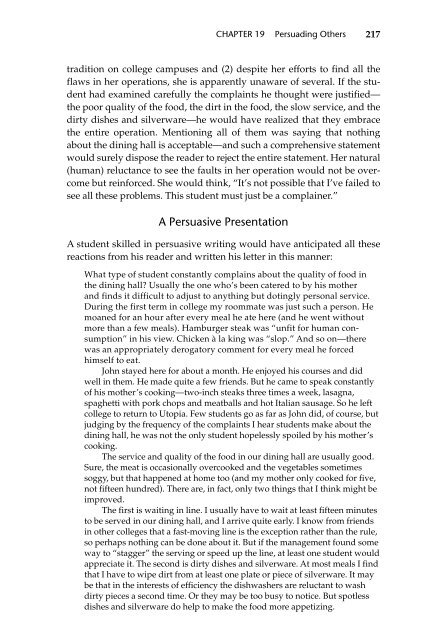Beyond Feelings
Beyond Feelings
Beyond Feelings
You also want an ePaper? Increase the reach of your titles
YUMPU automatically turns print PDFs into web optimized ePapers that Google loves.
CHAPTER 19 Persuading Others<br />
217<br />
tradition on college campuses and (2) despite her efforts to find all the<br />
flaws in her operations, she is apparently unaware of several. If the student<br />
had examined carefully the complaints he thought were justified—<br />
the poor quality of the food, the dirt in the food, the slow service, and the<br />
dirty dishes and silverware—he would have realized that they embrace<br />
the entire operation. Mentioning all of them was saying that nothing<br />
about the dining hall is acceptable—and such a comprehensive statement<br />
would surely dispose the reader to reject the entire statement. Her natural<br />
(human) reluctance to see the faults in her operation would not be overcome<br />
but reinforced. She would think, “It’s not possible that I’ve failed to<br />
see all these problems. This student must just be a complainer.”<br />
A Persuasive Presentation<br />
A student skilled in persuasive writing would have anticipated all these<br />
reactions from his reader and written his letter in this manner:<br />
What type of student constantly complains about the quality of food in<br />
the dining hall? Usually the one who’s been catered to by his mother<br />
and finds it difficult to adjust to anything but dotingly personal service.<br />
During the first term in college my roommate was just such a person. He<br />
moaned for an hour after every meal he ate here (and he went without<br />
more than a few meals). Hamburger steak was “unfit for human consumption”<br />
in his view. Chicken à la king was “slop.” And so on—there<br />
was an appropriately derogatory comment for every meal he forced<br />
himself to eat.<br />
John stayed here for about a month. He enjoyed his courses and did<br />
well in them. He made quite a few friends. But he came to speak constantly<br />
of his mother’s cooking—two-inch steaks three times a week, lasagna,<br />
spaghetti with pork chops and meatballs and hot Italian sausage. So he left<br />
college to return to Utopia. Few students go as far as John did, of course, but<br />
judging by the frequency of the complaints I hear students make about the<br />
dining hall, he was not the only student hopelessly spoiled by his mother’s<br />
cooking.<br />
The service and quality of the food in our dining hall are usually good.<br />
Sure, the meat is occasionally overcooked and the vegetables sometimes<br />
soggy, but that happened at home too (and my mother only cooked for five,<br />
not fifteen hundred). There are, in fact, only two things that I think might be<br />
improved.<br />
The first is waiting in line. I usually have to wait at least fifteen minutes<br />
to be served in our dining hall, and I arrive quite early. I know from friends<br />
in other colleges that a fast-moving line is the exception rather than the rule,<br />
so perhaps nothing can be done about it. But if the management found some<br />
way to “stagger” the serving or speed up the line, at least one student would<br />
appreciate it. The second is dirty dishes and silverware. At most meals I find<br />
that I have to wipe dirt from at least one plate or piece of silverware. It may<br />
be that in the interests of efficiency the dishwashers are reluctant to wash<br />
dirty pieces a second time. Or they may be too busy to notice. But spotless<br />
dishes and silverware do help to make the food more appetizing.


